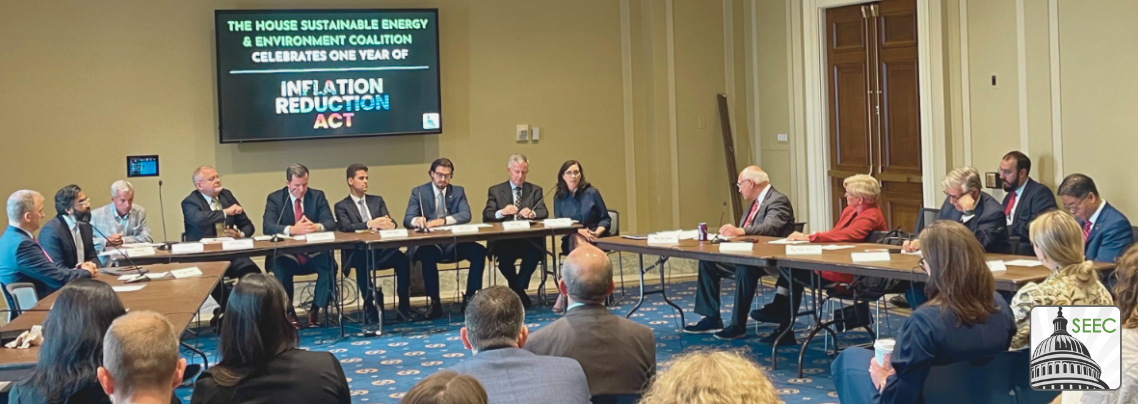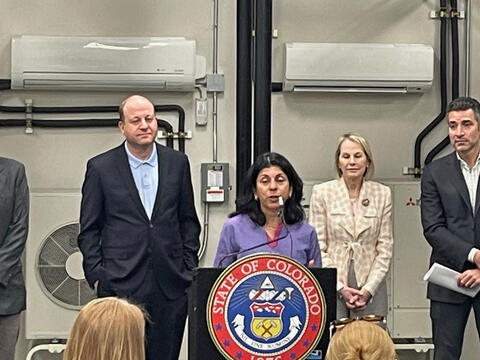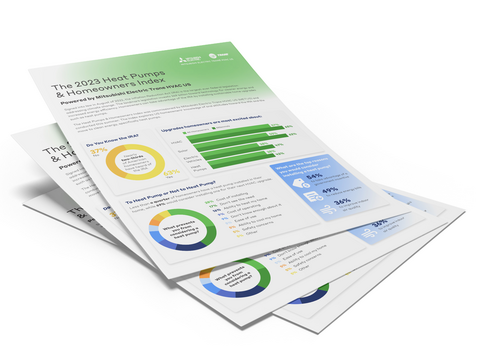METUS CEO Mark Kuntz Speaks to Sustainable Energy & Environment Coalition About Benefits of All-Climate Heat Pumps

In celebration of the one-year anniversary of the Inflation Reduction Act (IRA), Mark Kuntz, Mitsubishi Electric Trane HVAC US (METUS) CEO, recently spoke at the House of Representatives Sustainable Energy & Environment Coalition (SEEC) roundtable. Kuntz was among the eight private sector business representatives invited to the Washington, D.C., roundtable to discuss IRA-induced changes occurring in the clean energy sector.
Specifically, Kuntz talked about the impact that billions of dollars in consumer rebates will have on heat pump adoption. He also highlighted the key role high-efficiency heat pumps will play in reducing carbon footprint, reducing utility costs for consumers and creating new job opportunities. While Mark was the only HVAC representative, other panelists included representatives from the geothermal, Lithium-ion battery and renewable energy industries.
Kuntz explained that METUS’ primary products are high-efficiency, inverter-driven heat pumps, known as all-climate heat pumps. He shared some key benefits the technology brings in helping the United States achieve a strong and resilient clean energy economy.
Heat pumps are more environmentally friendly than conventional HVAC systems
According to Rewiring America, if all the nation’s single-family homes adopted heat pump technology, total annual emissions reduction would reach 160 million metric tons of CO2 – the equivalent of removing 36 million cars from the road for one year. As such, heat pump systems will be critical in reaching the country’s decarbonization goals.
Energy-efficient heat pumps are powered by electricity. Considered critical clean technology, heat pump solutions produce between two and five times the amount of heat that they consume in electricity, shaving dollars off consumers’ energy bills, particularly those reliant on inefficient fossil fuel-fired systems.
Homeowners are being incentivized to install heat pumps
The IRA addresses common barriers previously inhibiting heat pump adoption, especially for low- to moderate-income households. Three of the IRA programs METUS expects to have the most significant impact are the:
- Home Energy rebates, an $8.8-billion program enabling single and multifamily homes to receive rebates for energy-efficiency and electrification projects, including installation of all-climate heat pumps.
- 25C tax credit, a 10-year program providing a tax credit of 30%, up to $2,000, for qualifying home heat pump installation.
- Greenhouse Gas Reduction Fund, a $27 billion investment aimed to mobilize financial and private capital in the fight against climate change and ensure America’s economic competitiveness.
Between 2022 and 2030, METUS anticipates a total market demand of 37.5 million heat pumps, a significant portion of which can be attributed to direct and indirect effects of the IRA. With increased demand, more jobs will be created for local heat pump contractors and energy auditors, most of which are small business owners or employees.
METUS invests millions of dollars annually to teach contractors how to install and service these sophisticated systems in its 110 training centers across the nation, leading to strong job growth across every state.
Modern heat pumps heat and cool homes
Heat pumps work effectively anywhere, including the coldest climates in the United States. Kuntz cited a project METUS did in Michigan’s upper peninsula that involved adding all-climate heat pumps to 60 low-income homes in the Ontonagon Village Housing project to provide year-round comfort in an area that experiences extreme cold.
The 60-unit, all-electric, 15-building property had formerly relied on electric resistance for heating, but these systems did not provide adequate heat in indoor spaces when temperatures were freezing or lower.
METUS heat pump units were installed, and the project was centrally billed to track usage and energy savings. Residents of the Ontonagon Village Housing project were thrilled with getting clean, circulated air through the heat pump systems and no longer needed to use electric-resistant heat. They stayed warm during sub-zero temperatures and had the added benefit of receiving air conditioning in the summer. The project’s energy costs went from $95,000 to $65,000 annually – a 35% decrease.
METUS spreads the word about the advantages of energy-efficient heat pumps
In sum, Kuntz told SEEC participants that through METUS, contractors aren’t the only ones learning about the benefits of all-climate heat pumps. METUS is on a mission to educate consumers about the advantages of these systems and their role in decarbonizing the United States. Learn more at https://www.mitsubishicomfort.com/.








